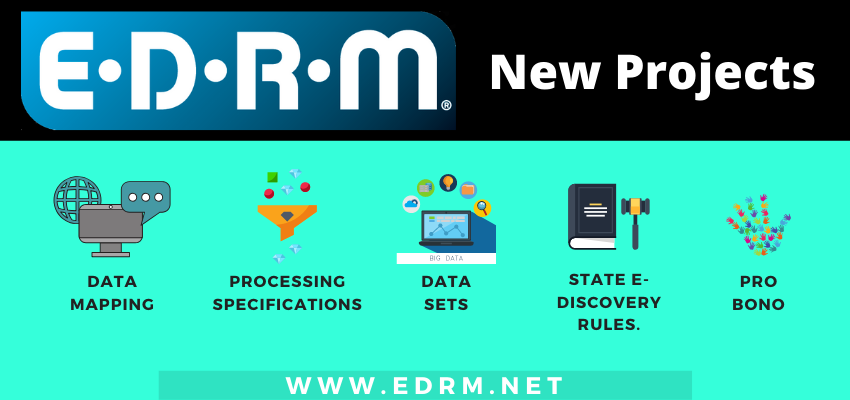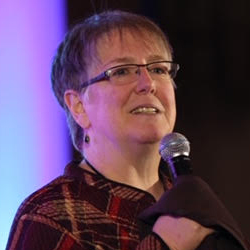
MINNEAPOLIS, MN, UNITED STATES, February 26, 2020 /EINPresswire.com/ — Setting the global standards for e-discovery, the Electronic Discovery Reference Model (EDRM1) is pleased to announce five new projects to help improve frameworks, resources and standards for the global community and is seeking new contributors for them.
“We are excited about the new ideas and new projects being initiated in the first quarter of 2020,” says Reed Smith partner David Cohen, chair of the EDRM board of trustees. “These projects will add to the many ongoing projects within EDRM, all designed to benefit the larger legal community and we are fortunate to have each of them championed by industry experts.”
The new Data Sets project is being championed by Cash Butler, founder of Clarilegal, and is seeking project participants. “Everyone still tests and demonstrates with the very old and familiar data set that is comprised primarily of Enron email and attachment data,” claims Cash Butler. “A new modern data set needs to be created that is focused on modern data types as well as email. Slack, Snapchat, Instagram, text messaging, GPS and many other data types that are needed for testing and demonstrating how they process and present in a useful way. In addition, to creating the new data set we will also look to form a framework for community members to easily add, curate and update the data set to stay current.”
John Tredennick, founder of Merlin Legal Open Source Foundation is championing the Processing Specifications project with the help of co-trustees Craig Ball, president, Craig D. Ball P.C. and Jeffrey Wolff, director of eDiscovery services and principal architect, ZyLAB. The Processing Specifications project will run in parallel with the Merlin Foundation’s programming project for processing.
Eoghan Kenny, associate, senior manager data projects and Rachel McAdams, data projects, at A & L Goodbody, Ireland are championing the Data Mapping project, which the need has arisen due to the new SEAR Act (senior executive accountability regime) to help provide frameworks around who is responsible for what data and where it resides. “The importance of data mapping has grown enormously in Europe – not just for GDPR and investigation purposes, but also to help organizations deal with the increasingly active regulatory environment,” says Kenny. “However, most of our clients struggle with data mapping as it is a new concept to most organizations, with no clear business owner, that often sits in limbo between the “business” and “IT”! The goals of this project are to build frameworks for data mapping exercises, and provide clear guidelines on what the process should look like, because the better an organization understands its data, the cheaper it is to comply with any discovery or investigation obligations.”
Suzanne Clark, discovery counsel at eDiscovery CoCounsel and Janice Yates, senior e-discovery consultant at Prism Litigation are co-championing the State eDiscovery Rules project and how they relate to the eDiscovery Federal rules in place. The vision for the State eDiscovery Rules project is to provide a starting point for attorneys to quickly reference the rules in different states and compare and contrast to the federal rules with the various state rules relating to eDiscovery. For example, if an attorney is involved with a case in a state where they are not accustomed to practicing, this EDRM resource will allow them to quickly get up to speed on that state’s rules, where they differ and where they align with the federal rules. “The project work happening at the EDRM is impressive,” says Suzanne Clark. “The time and talent that the project leads and participants donate to the cause of advancing eDiscovery knowledge and good practices will surely serve to advance the industry and legal practice in the discovery realm.”
The project will start with Florida and Michigan and are looking for more contributors from other states.
EDRM’s Pro Bono project was just launched and has had an overwhelming reach out from people in every area, attorneys, paralegals (and associations), litigation support professional, service providers, platforms, corporations and those in need. We are still seeking assistance as the need for access to justice is great. Stewarded by BDO director, George Socha and HB Gordon, eDiscovery manager for the Vanguard Group, the Pro Bono project will create subgroups to accelerate providing eDiscovery services to those in need.
Projects, both ongoing and newly initiated, will be advanced at the EDRM Summit/Workshop 2020 at Duke University School of Law, June 24-26.
To learn more about how to participate or contribute to an EDRM project or start a new project, please reach out to info@edrm.net.
About EDRM
Empowering the global leaders of e-discovery, the Electronic Discovery Reference Model (EDRM) creates practical resources to improve e-discovery, privacy, security and information governance. Since 2005, EDRM has delivered leadership, standards, best practices, tools, guides and test datasets to improve best practices throughout the world. EDRM has an international presence in 113 countries and growing and an innovative support infrastructure for individuals, law firms, corporations and government organizations seeking to improve the practice and provision of data and legal discovery. Learn more about the EDRM today at EDRM.net.
Vicki LaBrosse
Edge Legal Marketing for EDRM
+ + +1 651.552.7753
email us here
Visit us on social media:
Twitter
LinkedIn
1 https://edrm.net/


